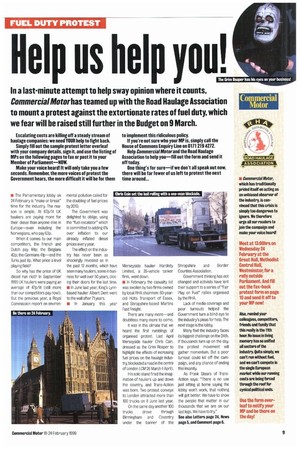elp us help you.
Page 11

If you've noticed an error in this article please click here to report it so we can fix it.
In a last-minute attempt to help sway opinion where it counts, Commercial Motor has teamed up with the Road Haulage Association to mount a protest against the extortionate rates of fuel duty, which we fear will he raised still further in the Budget on 9 March.
Escalating costs are killing off a steady stream of haulage companies: we need YOUR help to fight back.
Simply fill out the sample protest letter overleaf with your company details, sign it, and use the listing of MPs on the following pages to fax or post it to your Member of Parliament—NOW.
Make your voice heard! It will only take you a few seconds. Remember, the more voices of protest the Government hears, the more difficult it will he for them to implement this ridiculous policy.
If you're not sure who your MP is, simply call the House of Commons Enquiry Line on 0171 219 4272.
Help Commercial Motor and the Road Haulage Association to help you—fill out the form and send it off today.
One thing's for sure—if we don't all speak out now, there will be far fewer of us left to protest the next time around...
• The Parliamentary lobby on 24 February is "make or break" time for the industry. The reason is simple. At 67p/lit UK hauliers are paying more for their diesel than anyone else in Europe—even including the Norwegians, who pay 63p.
When it comes to our main competitors, the French and Dutch pay 44p; the Belgians 42p; the Germans 41p—and the Turks just 8p. What price a level playing field?
So why has the price of UK diesel run riot? In September 1995 UK hauliers were paying an average of 47p/lit (still more than our competitors pay nowe. But the previous year, a Royal Commission report on environ
mental pollution called for the doubling of fuel prices by 2010.
The Government was delighted to oblige, using the 'fuel escalator" which is committed to adding 6% over inflation to our already inflated diesel prices every year.
The effect on the industry has never been as shockingly revealed as in the past 12 months, which have seen many hauliers, some in business for well over 50 years, closing their doors for the last time.
• In June last year, King's Lynnbased haulier Albert Dent went to the wall after 71 years.
• In January this year Merseyside haulier Hardisty Limited, a 35-vehicle tanker firm, went down.
• In February the casualty list was swollen by two firms owned by local RHA chairmen: 60-yearold Hoes Transport of Essex, and Shropshire-based Martins Fast Freight, There are many more—and doubtless many more to come.
It was in this climate that we heard the first rumblings of organised protest. Last April Merseyside haulier Chris Cain, dressed as the Grim Reaper to highlight the effects of increasing fuel prices on the haulage industry, blockaded a road in the centre of London (C11426 March-1 April).
His solo stand fired the imagination of hauliers up and down the country, and Trans-Action was born. Two protest convoys to London attracted more than 100 trucks on 8 June last year.
On the same day another 100 trucks drove through Birmingham and Coventry under the banner of the Shropshire and Border Counties Association.
Government thinking has not changed and activists have lent their support to a series of "Fair Play on Fuel" rallies organised by the FIHA.
Lack of media coverage and poor turnouts helped the Government turn a blind eye to the industry's pleas for help. The next stage is the lobby Many feel the industry faces its biggest challenge on the 24th. If thousands turn up on the day, the protest movement will gather momentum. But a poor turnout could kill off the campaign, and any chance of ending this insanity.
As Frank Stears of TransAction says: "There is no use just sitting at home saying the lobby won't work, that nothing will get better. We have to show the people that matter in our thousands that we are on our last legs. We have to try."
See also Letters page 24, News page 5, and Comment page 6.
















































































































